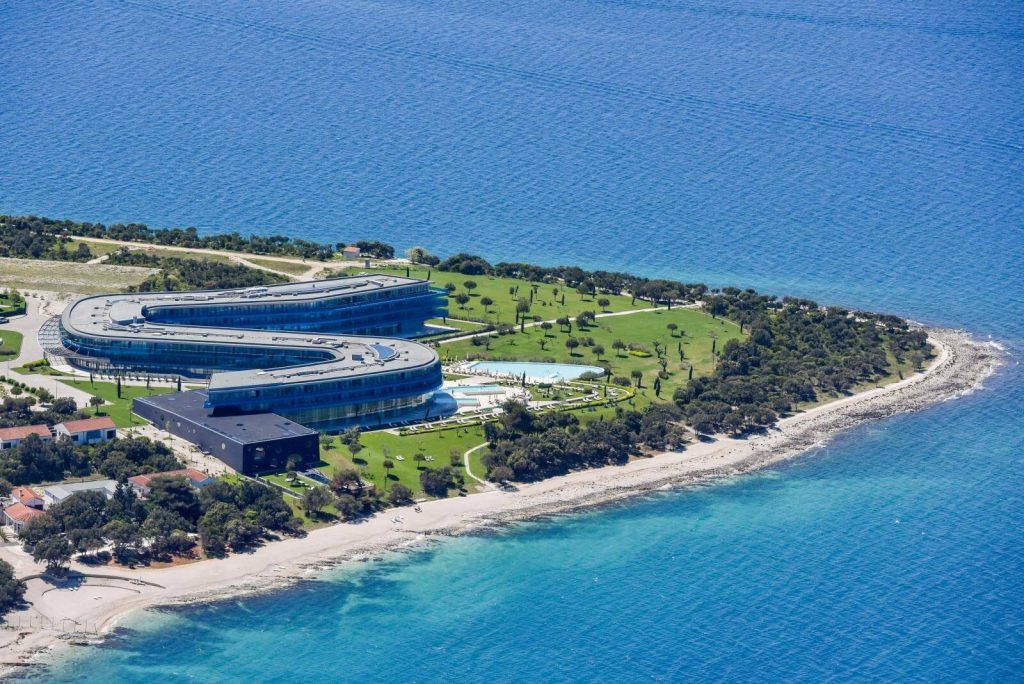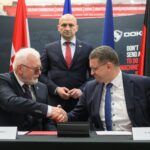Georg Unterkircher is the head of the Falkensteiner Punta Skala resort, and after living in Zadar for the last 13 years, he already understands the Dalmatian mentality and is developing the tourist offer of this area. Although the coronavirus pandemic has stopped the entire tourism industry, bookings are above expectations this season. The resort’s offer will undoubtedly be enhanced by the opening of the Fortis Club convention and sports center. The awakening of the MICE segment in the off-season also raises optimism for the good continuation of business, as well as new investments in infrastructure and quality of service.
Poslovni Turizam caught up with Georg Unterkircher to learn more.
Behind us are two difficult business years caused by the Covid-19 pandemic. How did it affect the resort? How have you adapted to the new conditions in hotel management?
This pandemic surprised us at the beginning of 2020, just like all other industries. In the beginning, it was very challenging to make short-term business plans, let alone long-term ones. Fortunately, the entire group is very committed to maintaining the company’s stability and preserving jobs, so we have accordingly adopted measures that will ensure this. Despite the uncertainty of the situation, we have been actively working on improving the quality of our products to be ready for another season ahead. Our long-term goal is to provide guests every year with the already well-known outstanding service they are accustomed to in Falkensteiner hotels and also to improve the facilities, programs, and activities that our resort offers.
This year started cautiously, and I have to admit that we had a satisfactory number of primarily domestic guests in the spring months. Unfortunately, travel restrictions were still in force in most countries from which we traditionally have guests, such as the Austrian and German markets. Compared to the previous year, reservations went a bit slower than last year at this time because no pandemic had been declared at that time. What kept us optimistic was that we had a relatively successful season, given the situation throughout 2020. This year we hoped and expected even better results, which of course depended on the global situation and travel conditions. People have been denied travel for a long time, so this gave us hope that the need and desire for travel and vacations will be strengthened and bring good results. I must emphasize that we were active in marketing terms throughout the pandemic to be in sight of our potential guests during the lockdown, and we are pleased to interact with guests and followers on our social networks. With the border openings, primarily Austria and Germany, the situation has significantly improved; we were ready for the last-minute bookings that happened as expected.
We are witnessing a positive trend in tourist traffic in Croatia, equal to that before the pandemic. What is the current occupancy of the Falkensteiner hotel in Zadar and Petrčane? Are there any differences in the types of guests compared to 2019?
I am glad to confirm that our figures are generally better in July and August, but the reasons for this, let’s be realistic, lie in several factors. Croatia is undoubtedly a very popular destination in the last few years. Still, this year it is supported by the unstable situation of other popular Mediterranean destinations (fires in Turkey and Greece, Spain and Portugal in the red zones), the relatively safe health situation on the Croatian coast and its most popular destinations, safe conditions that I believe, is created not only by us at Falkensteiner, but also by other tourist entities, safe arrival at the destination, and more and more car tourists who have decided to travel independently for the past two years. Our traditional markets are Austria and Germany, we record fewer guests from Italy but at the same time an increase in guests from Central and Eastern Europe – the Czech Republic, Slovakia, Hungary, Poland. There is a slightly larger number of domestic guests in our resort in the high season than in previous years. But keep in mind that our work does not stop at the end of August and that we must all work together to attract guests in the off-season. As the resort is open all year round, we will host several MICE events in the off-season, which we are happy about because the MICE segment is slowly waking up. In addition, we are planning several exciting weekend events for local guests, but more on that soon.
Apart from the trend of last-minute bookings, what other trends and habits do you notice in sales this year?
This season has been in many ways different from previous ones, especially in terms of last-minute bookings, which are the primary feature of this season. Although we planned promising results, we are glad that it was above expectations. It is visible how guests more often book directly. Above all, they are looking for a safe vacation that we have provided with our Safe stay concept. There is also a focus on active holidays and vacations in nature, where Punta Skala resort offers many opportunities. Today’s guests want a personalized approach more than ever. The sales process requires an individual approach in the short term. Our team has successfully adapted to the demands of the market so that we have focused our sales activities on the requirements of each guest, and we have once again confirmed that we are truly the right choice for all guests in all life cycles.
Last year, the large Fortis Club convention and sports center at the Punta Skala resort was announced. Is it operational, and what results do you expect from that investment?
We are pleased to have finally opened the Fortis Club in July, which has significantly enriched the offer of the Falkensteiner Punta Skala resort and opened the door to new business opportunities in both domestic and international markets. We expect excellent results, primarily in the segment of the MICE industry and sporting events. Fortis has immeasurably enriched the congress, sports, and recreational offer of the Punta Skala resort.
The MICE segment is slowly recovering due to several limitations and epidemiological measures when organizing events. What do you think business events will look like in the future?
We already have reason to be optimistic about organizing various events in our resort because, in 2021, we had the opportunity to hold a significant number of smaller events, while autumn this year brings us several important events. Event organizers focus on an authentic experience and combine smaller business or professional gatherings with active or sports elements. Demands for larger events are also in the direction of active elements. Sure, hybrid events will linger, but they won’t completely replace live encounters. The direct interaction of ideas and knowledge is essential for developing creativity and global progress, especially after a long period when we have not been able to do so.
You also manage Falkensteiner hotels in Serbia and Montenegro. To what extent do these markets differ from the Croatian market?
That’s right, I’ve been working in Croatia for a full and happy 13 years, but in 2020 I also took over Falkensteiner Hotel Belgrade and Falkensteiner Hotel Montenegro. Although there should be no significant differences in a geographically small area, in terms of tourism, our hotels in Montenegro, Serbia, and Croatia are entirely different products. Falkensteiner Hotel Montenegro is a hotel located in Bečići; it is a renovated Queen of Montenegro hotel with a long tourist history in the destination, its dominant guests are air guests, and this year it is evident how much it depends on the agreed flights, especially from the markets of Serbia, Russia, Ukraine, and other CIS countries. In addition, groups come to us from Israel, and the most significant number of individual guests come from Serbia. Falkensteiner Hotel Montenegro is a location that guests choose at the last minute. Bookings are only a few days before arrival, and the previous two years, it is characterized by a very short season that should be extended in the long run with the National Tourist Board.
Falkensteiner Hotel Belgrade is our city hotel located in the business zone in Novi Belgrade, and whose business is affected slightly less than the Falkensteiner Hotel in Prague and Bratislava. The excellent positioning of the hotel and the services we offer attract mostly business people from Serbia and the closer region who often stay with us, so the hotel is recording positive results this year, regardless of the instability caused by the pandemic. MICE is also one of the critical branches of the hotel business, which fortunately is slowly waking up, and we believe that it will ensure good occupancy in the autumn months.
Unlike them, we have developed Falkensteiner Punta Skala in the last few years into a sport and ecological resort with a unique offer in Croatia. Therefore, it is not surprising that many famous athletes have chosen Punta Skala for their professional preparations and private vacation. Furthermore, every year the traditional triathlon championship, Zadarhalf triathlon, which is held for the seventh year, brings many sports lovers here, not only professionals but also their families, making this resort an ideal destination for the whole family.
Fans of active life are thrilled by the outdoor sports center with numerous sports fields, from tennis to beach volleyball. With the construction of the new sports complex, Fortis Club resort also has a professional fitness center on 800 m2, new yoga and group training halls, a new sushi restaurant, a fun zone with a bowling alley, billiards, a gaming zone, and a bar.
As a good sports massage goes perfectly after sports, all lovers of wellness treatments come to their senses because the most beautiful Spa in Croatia is located here – AcquaPura Spa. On as much as 6,000 m2, our guests enjoy numerous spa treatments, relaxation, saunas, swimming pools, and a hammam. All this makes the resort a desirable location for lovers of active life.
Are there any plans to open new Falkensteiner hotels in Croatia, especially on the continent?
The Falkensteiner Group is always active in terms of investments, and this is what characterizes it because it is continuously working on expanding its hotel network and improving services. We are currently realizing new hotels in Austria and Italy, while in Croatia, we are working on new infrastructure within the existing resorts of Borik and Punta Skala. The master plan for the development of the Punta Skala resort includes investments in the complete refurbishment of the Diadora Hotel, which will be even more adapted to children and generally families with children in terms of interactive facilities in public spaces, wholly refurbished and interactive rooms, new Falky playroom, and many other new facilities. In the coming years, we plan to build several luxury villas and the new infrastructure of the resort, which will include smaller local shops, new bars, and restaurants, the central square as a place of events and entertainment, etc. We are convinced that the direction in which we plan infrastructure development, content, and offers will further attract old and new guests to our resort.
Has the tourist development of Dalmatia reached its maximum? Everyone is talking about sustainable tourism, but it is happening slowly in Croatia. What is your vision for the tourism development of this region?
Tourism in the region happens under the influence of several factors; there is primarily the destination’s natural beauty, which undoubtedly attracts enormous amounts of guests. Guests will always look for beautiful locations, quality infrastructure, proximity to the sea and beaches. Although this is consistently highlighted as a comparative advantage of Croatia, trends show that some other values come to the fore and significantly affect the final decision on where to stay. The potential of Zadar and Zadar County lies not only in new investments in new accommodation facilities of high categorization that are necessary for the destination but also in stronger branding of the county as a destination for active vacations, culture, gastronomy; the choice is progress. The proximity of several national parks and nature parks provides unlimited recreational opportunities such as cycling, trekking, hiking, etc. They should be well and continuously communicated in all emitting markets. Furthermore, the position of Ravni Kotari opens countless opportunities for the development of family farms and, in the future, quality continental tourism. Istria is the best example of how a destination can be developed in this direction and branded on the tourist map of the Mediterranean.
The potential is enormous; it is only essential that all entities look in the same direction – from political structures, tourist boards to businesses to turn the prospect into a developed and strongly branded destination, with a long-term source of income for residents throughout the region.
You have been the director of the Punta Skala resort for 13 years. Have you settled in, and what do you like most about the Zadar region?
Good question! Yes, I have lived in Zadar for thirteen years, and I already feel a bit like a Dalmatian, especially when it comes to Dalmatian songs. I was born in South Tyrol in a small village near the popular winter destination of Kronplatz, where we opened a new 5-star hotel at the end of last year, ‘adults only’ on the ski slope itself. That way of life shaped my childhood. I later lived in big cities like Prague and Vienna, after which I arrived in Zadar. The first words I learned in Croatia, related to work, are “nema problema” and “sutra. “ Although it was exciting and challenging for me, especially in the first years of living and working in Zadar, the openness of local people and the willingness to create great stories together is what sold me forever. The people I work with today are people I believe in and love to work with, who I love to both relax and sing with. It is this famous Dalmatian way of life that I do not plan to change.
For more, check out our dedicated travel section.








